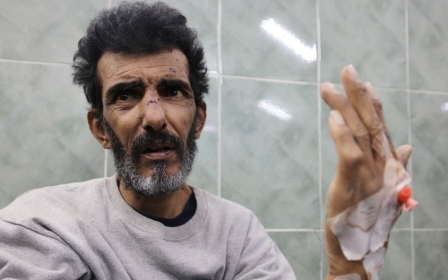Palestinian prisoners released from Israeli jails tell of terrible impact of abuse

Severely damaged skin, signs of fatigue, unkempt hair and long beards - this was the state in which a number of Palestinian prisoners emerged from Israeli prisons following six months of detention.
In the past few days, at the end of six months of renewable administrative detention, Israel released dozens of Palestinian prisoners from several jails - people who had been arrested in the wake of the start of the war on Gaza on 7 October.
The evidence of mistreatment shown by the prisoners is indicative of what rights groups have warned is an unprecedented level of abuse taking place in Israel's jails.
Community activist Omar Assaf was among those released in recent days. Assaf, 74, was arrested on 24 October after his house in central Ramallah was stormed by the Israeli army. He was immediately transferred to administrative detention, which allows him to be held without trial or charge for as long as the authorities want.
After completing the first six months, he was released from Ofer Prison. His appearance at the prison entrance shocked both friends and family.
Stay informed with MEE's newsletters
Sign up to get the latest alerts, insights and analysis, starting with Turkey Unpacked
He told Middle East Eye that the prison conditions were indescribably cruel, and that his appearance speaks volumes about the condition of Palestinian prisoners.
The beloved Omar Assaf, my high-school Arabic teacher & a wonderful community organiser.
— Jalal #CeasefireNow (@JalalAK_jojo) April 22, 2024
He was just released from Israel's prison camps after six months of "Adminstrative Detention" - meaning held without charge or trial, like 5210 other Palestinians kidnapped since October 7. pic.twitter.com/vDfmPY8sG3
“They constantly assaulted the prisoners with severe beatings, using batons, rifles, and heavy shoes," he explained.
"There were prisoners with broken ribs and limbs without providing them with any treatment."
‘They denied me treatment’
Palestinian prisoner groups say the Israeli army has arrested more than 8,000 Palestinians from the West Bank alone since 7 October, including 280 women and at least 540 children.
Rights groups have documented widespread mistreatment, with the United Nations agency for Palestinian refugees (Unrwa) last week releasing a report detailing - among other abuses - detainees being urinated on and made to act like animals, and children being attacked by dogs.
In January, while imprisoned, Assaf felt dizzy and fell to the ground, cutting his head and bleeding. He remained bedridden for two weeks without receiving any treatment.
Palestinian youth Islam Dar Musa was released this morning after six months in Israeli detention.
— Quds News Network (@QudsNen) April 19, 2024
Here is how he looked before and after his imprisonment. pic.twitter.com/11U4AwInYV
He remained in an unstable condition. In March he appeared in court and told the judge that he had been subjected to deliberate medical negligence.
"The judge tried to deny this, so he asked me: 'What could the jailers do for you?'" he explained.
"I replied: 'I am not a doctor, but I know that the simplest first aid is to try to stop the bleeding by shaving the hair, applying bandages and medicine, then stitching the wound if necessary.'"
Due to the continued bleeding, Assaf was exposed to infection, and it was found that he lost 30kg of weight due to neglect.
At around this time, Israel began limiting meals to Palestinian prisoners, to just one daily meal of no more than 150 grams of rice and lentils.
This is the 10th time that Assaf has been arrested, but he says that it was the cruellest detention of all, especially since almost all of the prisoners were subjected to insults, beatings and ill treatment.
Psychological problems
A researcher at the Palestine Center for Prisoner Studies, Amina Al-Tawil, shared with MEE some of the testimonies she had gathered from prisoners.
She explained that the overwhelming majority of prisoners were beaten, humiliated and assaulted, and the focus was on the head area, with the aim of causing the greatest possible damage.
Some appeared to confirm an incident involving far-right Israeli Minister of Internal Security Itamar Ben Gvir, during a visit to Megiddo prison earlier this year.
During the visit, prisoners were taken out to the yard in front of him and beaten mercilessly. Then they were tied and forced to kneel, and he passed them one by one to confirm that they had been beaten. Some of them were bleeding.
“One of the prisoners looked up at Ben Gvir’s face, so a prison guard put out his cigarette in his eye, causing him to lose it,” she added.
'One of the prisoners looked up at Ben Gvir’s face, so a prison guard put out his cigarette in his eye, causing him to lose it'
- Amina Al-Tawil, Palestine Center for Prisoner Studies
At least 16 Palestinian prisoners are thought to have died since 7 October. Israel has refused to hand over their bodies to their families to bury them.
Head of the Prisoners and Ex-Prisoners Affairs Authority, Qaddoura Fares, said that the policy of violent beatings, in addition to causing the death of a number of prisoners, had also left many with severe psychological problems.
Mujahid Amarneh, 23, from Jenin, was arrested in 2021 and released several weeks ago. His father, Ezzedine, who was also arrested last May and released a month ago, says that when Mujahid was arrested, he was working in construction and was lively, active and social. He didn’t suffer from any physical or mental conditions.
During his stay in prison, Mujahid was beaten violently on the head twice in November and January, according to the testimonies of the detainees who were with him.
After that, he was unable to move or even go to the bathroom on his own. Then he began to suffer from other complications.
“He gradually became isolated and began to lose his speech... he doesn’t speak at all until now. He also became nervous, emotional, and sharp,” his father added.
Immediately after his release, tests were conducted on Mujahid at Ramallah Governmental Hospital, and x-rays showed that he had suffered a fracture in his shoulder bone and a severe bruise at the back of his skull.
Information blackout
There has been a complete blackout on the treatment of Palestinian prisoners, with rights groups relying on the testimonies of those released to document the abuse carried out against them.
The testimonies of Palestinian prisoners have horrified their families, and perhaps even more so the families of those with relatives still in jail.
Sojood Qazzaz from Hebron told MEE that whenever she looks at pictures of released prisoners and compares them to pictures taken of them before their arrest, she immediately begins to cry out of fear for the fate of her sick husband, Ammar Qazzaz, 33, who was arrested by the Israeli army on 11 October.
Ammar suffers from muscular dystrophy and cannot walk normally on his feet. He needs constant physical therapy sessions. Despite this, he was transferred to administrative detention for six months, after which his detention was renewed.
“In addition to his illness, my husband was severely beaten several times, which led to a number of his ribs being broken, his shoulder dislocated, and severe pain in the neck, back and legs. The jailers deliberately beat him intensely in these areas because they knew [those areas] were weak,” she added.
This information was obtained by Sojood from released Palestinian prisoners, as Israel prevents any means of communication between detainees and their families, deprives them of visits, and prevents visits to them by lawyers as much as possible.
“The reality of Israeli prisons is many times more difficult than it," said Tawil.
She said there needed to be "international pressure [on] Israel to at least lift the state of secrecy about their fates and what is happening to them, or allow them to communicate with their families."
Middle East Eye delivers independent and unrivalled coverage and analysis of the Middle East, North Africa and beyond. To learn more about republishing this content and the associated fees, please fill out this form. More about MEE can be found here.





